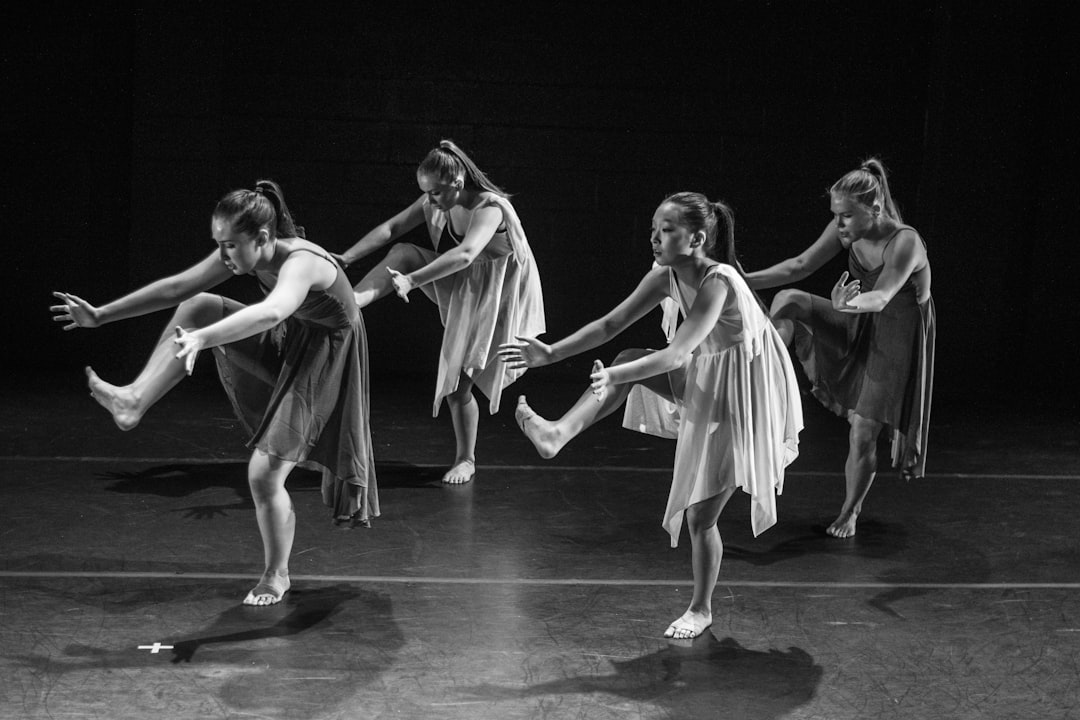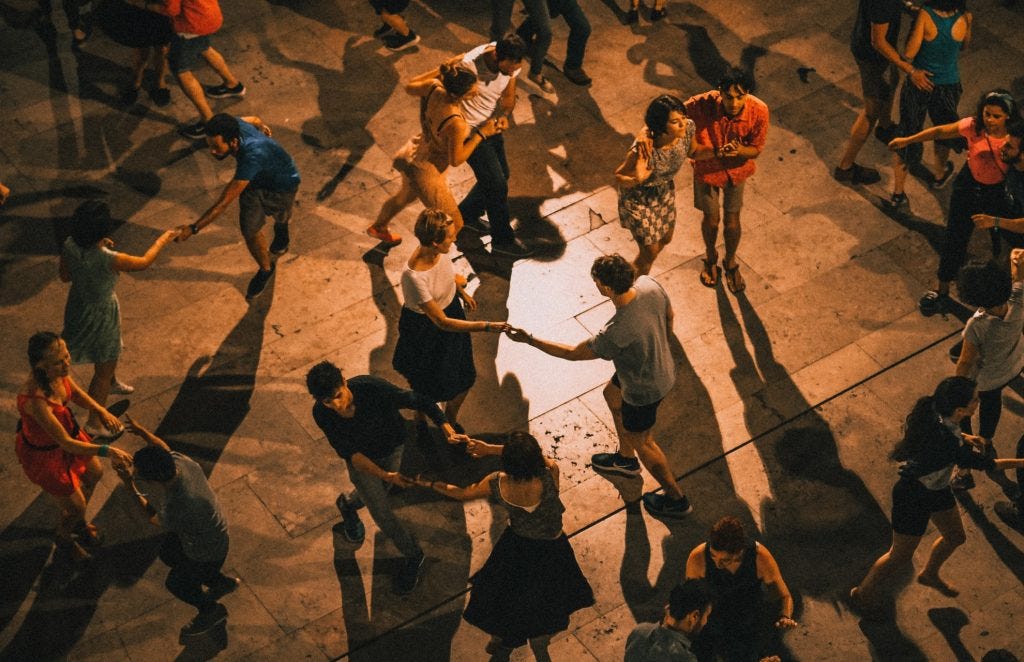My first love was dance.

Learning to dance was the first time I grabbed a hold of something that made no rational sense for me to love and that didn’t serve anyone but me. I was 15 years old when I started dancing– late by traditional standards. But my high school had a modern dance program and you could take classes for gym credit in the big, drafty art barn at the back of the campus, so I signed up.
Arlene Horowitz was our one and only dance teacher. She had tried out for The Rockettes back in the day and had the footwork to prove it. But by the time I knew her she was middle-aged, with a round belly, frowsy hair, and a sharp tongue.
It was the 80s, so we would all troop into class, our awkwardness carefully concealed under enormous, Flashdance-style, off-one-shoulder sweatshirts and men’s boxer shorts rolled up at the waist. Arlene would proclaim, “No shmatas in my class! Take off the shmatas! How can I teach you to dance if I can’t see your bodies?!?” Arlene was not to be denied, so we would reluctantly strip down to our skintight spandex of one kind or another (I remember I had a fire engine red, shiny unitard that featured regularly in my personal dance gear rotation.) and then, slowly but surely, she taught us how to inhabit our bodies. How to use them to express ourselves. How to throw ourselves at the world.
Like many kids, I led a physical life. I played sports. I walked everywhere. In the summers, I hiked, canoed, and rock-climbed. But dancing for Arlene was where I learned that I could say something with my body. I could pour so much feeling that I didn’t yet have words for into it and offer it to people. By moving my body through space I learned to take up space. To feel my energy extend beyond the tips of my fingers when I reached out a hand, beyond the confines of a physical reality that largely confounded me. I learned that I could be energetically enormous, and that, in fact, I always needed to extend beyond the outline of myself in order to communicate and connect. That was how communication and connection actually worked.
Arlene loved her handful of students who had started young and were technically accomplished. But she was unrelenting in her belief that technical prowess didn’t equate to communication and we were there to express and move people. I was never the best dancer, technically. Not by a long shot. But I was good at moving people, at throwing myself at the world as if shouting, See!?! Do you understand? It’s like this.
In college there was no formal dance program, just a bunch of students choreographing and organizing shows. So, I did that. Then I moved out to Seattle and was able to take classes again– modern and, eventually, ballet, which I was never great at. Though it did teach me how to understand micro-adjustments to posture and alignment in ways I still use to this day.
I wasn’t performing anymore. I’d moved into the adult world of dance and there was no longer an Arlene who believed that anyone and everyone should get on the stage. But I didn’t really miss it. I just wanted to move. To take up space.
In those days I also discovered partner dancing via Tuesdays at the queer Country Western bar. Every week I’d go with my friends, order watered-down drinks, and learn how to line dance and Texas Two-step in the arms of older lesbians and gay men in cowboy hats and button-down, collared shirts. Two-stepping was followed by salsa, which I learned when I went to Cuba a couple of times in my mid-twenties. Salsa happened everywhere, every day, but my favorite was always Wednesdays when they would open the wrought-iron gate of the Cultural Ministry and a full Afro-Cuban band, complete with congas and horns, would set up on the pillared porch. Hundreds of us would fill the stone patio that spread out into the lawn to dance, drink rum straight out of the bottle, sweat, and laugh for hours.
And then, somehow, it all stopped. I came back to the States. I ended up committed to a man who couldn’t dance, and I was not Arlene. I was impatient with his fumbling and arrogance in ways that probably weren’t helpful. But the traditional roles of lead and follow also echoed too clearly the daily power dynamics in our relationship and made me angry and panicked. I dreamed of going out dancing by myself, but that wasn’t part of our deal, me having autonomous joy. And, anyway, what if I went out and found that I loved it, and my daily life not so much? Better to just stay home.
When we first met, my ex-husband used to get angry at me for the way I could hold the attention of a group of people– a conversation gaggle at a party, a gathering around the dinner table. He felt I didn’t make space for him as I should, didn’t draw him into the conversation, or share everyone’s attention with him. That I constantly hogged the spotlight. He once sneered, “Someday, I’ll build a platform in the corner of our bedroom so you’ll always have a stage to perform on.”
All those years of learning to take up space, to inhabit myself and move people started to drain away. Like he had poked a sneaky little hole in the bottom of me and I was now a sieve instead of a container, unable to ever fill up, constantly hungry for his positive regard.
Since my marriage ended nearly a dozen years ago I’ve been slowly learning to be a solid container for my life, but recently I was reminded what it is to really take up space. Thanks again, after all these years, to dance.
I enrolled in a weekly West Coast Swing dance class. No partner, no idea what I was doing, but I started trooping over to a small, local tai chi studio on Tuesday nights anyway to learn how to move again. I quickly discovered that my early training and instincts hadn’t left me. My sense of rhythm was solid, and I picked up steps quickly. But the partnering was awkward, and not just for me. Clearly, my classmates and I weren’t used to touching strangers in that way, or in listening and responding non-verbally. At least not with our clothes on, and I didn’t go there to imagine anyone without their clothes on, so whether or not any of the other people in my class are better at listening and responding non-verbally when they’re naked isn’t something I particularly want to think about.
This past week, I was dancing with a classmate and our instructor stepped in to correct my form. She pointed out that, though I was doing all the steps properly, I kept looking down. Not at my feet. But always about four feet in front of me towards the floor.
I’d realized I was doing it, but told myself I was respectfully negotiating the potential discomfort of direct eye contact for other people. Not me, I told myself, feeling squirrelly. I mean, I have a kid on the spectrum. I’m aware that not everyone is comfortable with direct eye contact.
But, as soon as she stepped in and said it out loud, that I was persistently keeping my head lowered, that I needed to look up and move with my chest forward, I knew what was really going on. That little voice that I’ve carried since my childhood, that got very loud in order to survive my marriage was insisting, Don’t take up so much space.
The honest truth, which I knew in an instant, was that dancing again fills me with the most overwhelming joy. To stand up straight and let fierce delight pour out of me in close physical proximity to another person felt dangerously vulnerable.
My heart aches at the thought of my trepidation even now, just sitting here writing about it. I’m shying away from broadcasting my joy, from extending beyond the concrete outlines of myself to be energetically as big as I feel on the inside for fear of what, exactly? That some random, middle-aged guy with no rhythm might find me overwhelming? That he might assume my joy was directed at him specifically and respond in ways I’m not looking for? Or am I simply afraid to look over-eager and ridiculous?
I’d prefer to say that simply realizing all of this is some sort of magic bullet. That I will go to my next class and raise my eyes proudly, letting my joy trumpet out of my chest. But the reality is I’m going to have to work on it, watching for this learned tendency to make myself smaller than I am, and coax myself gently to resist it, connect, and take up space.
Might I, in the end, look ridiculous, or inspire some sort of reaction in my classmates? Anything is possible, I guess. But am I really going to hobble my own joy to protect myself from what are only possibilities that I am perfectly capable of handling, anyway?
This feels like necessary integrity work for me right now– to align my outsides with my insides, to not shy away from the vulnerability of it all. I never imagined when I signed up for a dance class it would be that, but here I am.




This hits. I was never good at taking up space, particularly as a kid. I liked to dance, though, but after letting go spectacularly at one middle school dance and being teased for it, I quit. I found other ways to take up space and sometimes I dance with my dogs or have been known to cut loose a little bit under the right combination of alcohol, low lighting, and good friends, but I never got back the abandon that 12-year-old me had.
It seems obvious to me that your ability to captivate people was one of the things that most attracted your ex-husband, and how unfortunate it is that we (*cough*men*cough*) can so selfishly strangle the best qualities in our loved ones. Wishing for you to reclaim all the glory of your groove. :)
This connects with me on many levels, not least via the beauty of your writing.
My then-husband and I took a ballroom dance class together as a distraction (ha, as if) after my mom died. We didn't dance together well at all, in part because I had a much better sense of rhythm (being a musician in high school) than he; I couldn't let him lead. We were spectacularly bad at the tango; another partner brought out all the sensuality of that dance with me, yet I never felt a spark between us and don't remember his name... just the glorious dancing with him.
The movement medium that resonated best with me is karate; it's both a solo and partnered practice where my kids and I trained. For a time, I was the only female practitioner at our dojo, among several younger men with physical jobs (carpenter, firefighter, etc.). I felt an obligation not only to claim my own space, but to hold space for future female students. After we left (we moved out of state), my son revealed that several of those big men were intimidated by me, because I never let up on them. Trying to reclaim that feeling now.